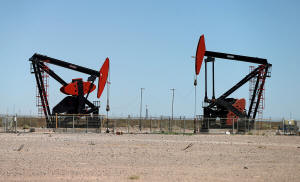Oil soars as US, UK strike on Houthis stirs up geopolitical worries
 Send a link to a friend
Send a link to a friend
 [January 12, 2024] By
Amanda Cooper [January 12, 2024] By
Amanda Cooper
LONDON (Reuters) -The oil price surged on Friday, as the escalating
conflict in the Red Sea region threatened to further disrupt global
trade, while stocks rose in light of U.S. inflation data that reinforced
investors' view that interest rates could soon fall.
Oil rose by 4% after the United States and Britain said they had
launched strikes from the air and sea against Houthi military targets in
Yemen in response to the group's attacks on ships in the Red Sea, a
dramatic regional widening of the Israel-Hamas war in Gaza.
Brent futures were last up 4% at $80.52 a barrel, while U.S. West Texas
Intermediate (WTI) crude rose 4.1% to $74.99.
"Oil prices have climbed sharply following the attacks, with Brent Crude
now around 7% higher since early December, before Houthi rebels began
targeting ships in the Red Sea," Susannah Streeter, head of money and
markets at Hargreaves Lansdown, said.
"Reports coinciding with the UK/US military action suggest the British
government is modeling scenarios which could see prices rise by $10 a
barrel, if the Red Sea crisis continues, with gas prices at risk of
going up by 25%," she added.

Meanwhile, global stocks rallied, underpinned by the prospect of a drop
in interest rates. The MSCI All-World share index was up 0.2%,
reflecting a bounce in Europe, where the STOXX 600 rose 0.7%, led partly
by a rally in shares of aerospace and defense companies, where the
sector index hit a record high.
U.S. stock futures fell 0.2%, while government bond yields edged lower,
reflecting demand among investors for safe-haven assets.
The dollar rose against a basket of major currencies, as did gold, which
benefited from investor risk aversion, rising 0.9% to $2,046 an ounce.
Other classic safe-havens such as the Swiss franc held mostly steady, a
situation that some analysts said could change.
"If we see a massive escalation of the situation ... then the
traditional flight-to-safety will see U.S. Treasuries, safe-haven
currencies like yen and Swiss franc benefit." said Khoon Goh, head of
Asia research at ANZ in Singapore.
STELLAR NIKKEI
In Asia, Japan's Nikkei extended its impressive gains so far this year,
jumping 1.5% to another 34-year high, helped by solid results from Fast
Retailing Co, owner of clothing brand Uniqlo.
[to top of second column] |

Oil pump jacks are seen at the Vaca Muerta shale oil and gas deposit
in the Patagonian province of Neuquen, Argentina, January 21, 2019.
REUTERS/Agustin Marcarian/File Photo

Chinese inflation data showed the country's economic recovery
remained weak in December, with the consumer price index falling
0.3% from a year ago. However, separate trade data showed exports
rose at a faster than expected clip last month while imports
returned to growth.
Data on Thursday showed U.S. consumer prices rose more than expected
in December, with a closely watched core measure coming in slightly
above consensus.
However, the details of the report showed that pressures picked up
in specific pockets of the consumer market, such as energy and the
cost of used cars, as well as other seasonal factors that should
abate, according to economist Mohit Kumar at Jefferies.
"Our view remains that for the Fed to cut rates aggressively they
need to either see the economy falling off a cliff or a sharp fall
in inflation. And we do not see either scenario," he said in a
morning note.
Fed officials drew few new conclusions from the data. Richmond Fed
President Thomas Barkin said it did little to clarify the path of
inflation.
Futures showed traders are attaching a 73% probability of a rate cut
by March, compared with 68% a day earlier. They are also pricing in
around 150 basis points (bps) of easing this year.
Treasuries held steady after a powerful rally in the shorter-dated
bonds overnight. The two-year yield was virtually unchanged at
4.27%, having fallen 11 basis points overnight, as was the 10 year
at 3.98%.
Euro zone government bonds drew in flows, pushing the yield on the
benchmark 10-year German Bund down 4 bps to 2.165%.
Adding some support in the European bond market were comments from
European Central Bank (ECB) President Christine Lagarde who said
rate cuts could happen if the central bank had certainty that
inflation had fallen to its 2% target.
(Additional reporting by Stella Qiu in Sydney and Rae Wee in
Singapore; Editing by Kim Coghill, Mark Potter and Hugh Lawson)
[© 2024 Thomson Reuters. All rights
reserved.]
This material may not be published,
broadcast, rewritten or redistributed.
Thompson Reuters is solely responsible for this content.
 |